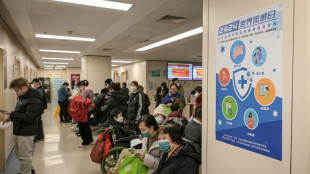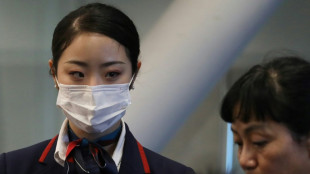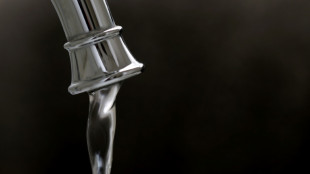
| RBGPF | -4.54% | 59.31 | $ | |
| CMSC | 0.04% | 23.11 | $ | |
| JRI | -0.83% | 12.12 | $ | |
| BCC | -2.04% | 115.05 | $ | |
| RIO | 0.76% | 59.08 | $ | |
| SCS | -2.82% | 10.99 | $ | |
| NGG | -2.92% | 56.335 | $ | |
| BCE | -2.03% | 23.16 | $ | |
| RELX | -0.66% | 46.465 | $ | |
| GSK | -1.47% | 33.26 | $ | |
| CMSD | -0.56% | 23.27 | $ | |
| AZN | 1.14% | 67.345 | $ | |
| RYCEF | 0.28% | 7.22 | $ | |
| VOD | -1.36% | 8.1 | $ | |
| BP | 0.67% | 31.33 | $ | |
| BTI | -1.69% | 36.13 | $ |

Hong Kong further eases Covid curbs, but many rules remain
Hong Kong announced Tuesday it would no longer require residents to use a scanning app to enter venues and that overseas arrivals could now visit bars and restaurants from the moment they land in a further easing of Covid restrictions.
But authorities confirmed they were keeping a host of other rules including mandatory PCR checks for overseas arrivals, daily testing of school children and compulsory mask wearing.
The latest measures come as authorities in mainland China navigate a rapid turn away from its zero-tolerance coronavirus strategy.
Hong Kong has been allowed to pursue a lighter version of China's zero-Covid strategy but it has still kept in place a raft of restrictions that most of the world has long since abandoned.
For much of the pandemic entry to public and commercial venues has been controlled by an app called "LeaveHomeSafe" that is linked to their vaccination status.
Residents have to scan QR codes to enter most premises and may only do so if fully vaccinated.
Meanwhile since September, when Hong Kong finally abandoned mandatory quarantine for all overseas arrivals, those flying into the city have been banned from entering bars and restaurants for the first three days while they undergo tests.
At his weekly press conference on Tuesday, Hong Kong chief executive John Lee said both those measures were now being scrapped.
"We have made these two decisions because we have considered the data and the risks," he told reporters, adding the new rules will come into effect on Wednesday.
The move will be a boost for businesses at a time when Hong Kong's recession-mired economy is suffering from more than two years of self-imposed isolation.
The tourist industry has been decimated by the pandemic with businesses vocally lobbying for an end to restrictions including the three-day restaurant and bar ban for overseas arrivals.
But Hong Kong is still a long way from returning to a pre-pandemic status.
Health chief Lo Chung-mau confirmed travellers from overseas will still need to undergo PCR tests on arrival and on day two.
Residents and tourists will also need to show proof of vaccination at certain venues, including restaurants, and a ban on more than 12 people gathering in public is still in place.
Daily antigen tests for school children will also remain compulsory alongside the wearing of masks, including for outdoors.
"I must stress again that we must still wear masks, especially because it's winter," Lo said. "This is a season when the Covid-19 virus is more active and also it is the seasonal flu period."
The border between Hong Kong and the mainland has been mostly closed to residents throughout the pandemic but hopes are now high that will change as China pivots away from zero-Covid.
Lo said city authorities were reaching out to counterparts on the mainland to ease travel restrictions between the two.
R.Buglione--LDdC



